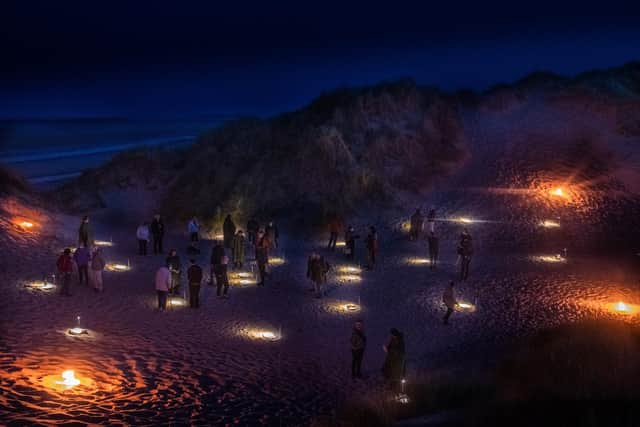Theatre reviews: Over Lunan | Rose


Over Lunan, Lunan Bay ****
Rose, Oran Mor, Glasgow ****
Where are we, when we are Over Lunan? In one sense, this new event created by Angus Farquhar’s Aproxima Arts company could not have a stronger sense of place; it is made and performed at Lunan Bay, Angus, one of Scotland’s most breathtaking beaches, and is immersed in the history and lore of that part of the Angus coast.


Yet like other site-responsive works created by Farquhar over the years – in locations from Alloway in Ayrshire to Glen Lyon and Skye – Over Lunan is also a hugely resonant piece of work, that invites us to travel not only in space but in time. Inspired by the work of journalist and documentary-maker Charlie Ross, who died at Lunan in 2015 while gathering material about the bay’s history and meanings, Over Lunan leads us for 70 minutes or so on a short but precarious night walk through the huge sand dunes that guard the bay, towards a dazzling final glimpse of the sea itself, glowing faintly in the dark.
Advertisement
Hide AdAt first, we are in a sheltered circular space full of glowing small lights and fires, each one illuminating an object that reflects on the history of Lunan, both recent and ancient. The show has an accompanying radio play about Charlie Ross’s final weeks in Lunan, that helps us to understand these objects, at least a little. The bay’s strange name, for example – and a chance beach encounter with a Syrian migrant now living in Scotland – sets up resonances that link the place with the earliest days of human civilisation, and Mesopotamian myths of essential human knowledge passed down by “fish people” who came from the sea; one of those demigods, the last of them, was called Lu-Nanna.
Then there is the mythology of the moon – luna – reflected in the crescent shape of the bay; also the fact that this whole North Sea landscape was reshaped, 8,000 years ago, by a huge undersea landslip which caused a giant tsunami and primal flood. All of this begins to come together, as we walk – while listening to an audio account of Lunan’s story – to the show’s second arena, a larger space surrounded by high dunes. Here, we sit to experience the centrepiece of the show, a 20 minute ritual or symphony created by composer Andrew Knight-Hill, with choral sections written in the ancient Sumerian language Akkadian, and performed in spectacular style – against a backdrop of blazing dune fires – by musicians Cameron Sinclair, John Kenny and Farquhar himself; then it’s out onto the beach itself, past a powerful tableau of refugee arrival and tragedy, back to our starting point.
Over Lunan, in other words, is a tremendously complex piece of art, whose meanings are difficult to decode in any immediate way, and which takes us on a journey that requires sudden, huge leaps of imagination. Yet it’s an experience – co-created by Farquhar with script-writer and dramaturg Purni Morell – that lingers and challenges us, as we face another age of rising waters and possible apocalyptic change; and invites us to reach back beyond history into myth and legend, to seek to understand how human civilisation emerged in the first place, how it was transmitted through crisis after crisis, and how the sea – now as much a graveyard as a source of life – has both shaped our story, and helped to carry it from shore to shore across the globe, across the centuries, and the millennia.


The mood could hardly be more different at this week’s lunchtime Play, Pie And Pint show Rose, a celebration of the life of the great Scottish footballer Rose Reilly. If Angus Farquhar’s shows are all about deep reflection and meditation, the mantra that drove Rose Reilly through her difficult early life was “don’t think, do”; and it’s only now – 49 years on from her first international match, for Scotland against England – that Reilly, in her mid-Sixties, is seeing her life chronicled and reflected upon, not least in this new 60-minute monologue by Lorna Martin, performed with impressive humour and passion by Christina Strachan.
Reilly was born in Stewarton in 1955, and began to play serious women’s football in the early 1970s; but in those days she could hardly afford to pause, in her relentless drive to build a footballing career despite endless obstruction by everyone from her mother – who feared her daughter was a becoming a freak – to schoolteachers, forever offering three of the belt, and, of course, the Scottish footballing authorities, whose antediluvian attitudes have already, this summer, been well aired in the excellent Sweet FA, seen at Tynecastle during the 2021 Fringe.
In 1972, 17-year-old Rose therefore had no option but to leave Scotland, first for France and then for Italy, where she became a star of women’s football, even playing for the victorious Italian team in the 1984 World Cup. At the turn of the millennium, after her retirement from the professional game, Reilly married, had a daughter, and returned to live in Scotland; and it was a privilege to see her take the stage and share the applause, as Rose opened at Oran Mor on Monday. This show also comes as a timely reminder, though, of how recently – just a generation ago – the men who run Scottish football were calling Rose and her comrades not “trailblazers and pioneers”, but unruly women who should be banned for life; and of how quickly these hard-won rights might disappear again, if we ever lose the fighting spirit that Reilly has always embodied, with such determination and grace.
Advertisement
Hide AdOver Lunan is at Lunan Bay, Angus, until 19 September; radio play via https://www.aproxima.co.uk. Rose is at Oran Mor, Glasgow, until 18 September, and at the Traverse Theatre, Edinburgh, from 28 September-2 October.


A message from the Editor
Thank you for reading this article. We're more reliant on your support than ever as the shift in consumer habits brought about by coronavirus impacts our advertisers.
If you haven't already, please consider supporting our trusted, fact-checked journalism by taking out a digital subscription at https://www.scotsman.com/subscriptions